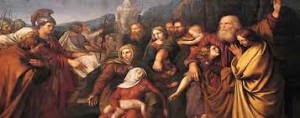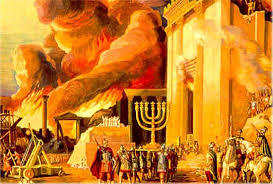The Real Hanukkah Story
Torah Living Daily Challenge 33
The true story and meaning of Hanukkah is encapsulated and recorded for posterity sake—praise Yahovah for that!—in the Maccabean Revolt or movement that occurred between the rise to power of Antiochus IV—surnamed Epiphanes–about the year 175 BCE to the death of Simon Maccabeus (also referred to as Simon Thassi) about the year 135 BCE.
Our Faith’s heritage is rich in so many facets, especially in regards to our Faith’s history. The story of Hanukkah as derived from the Maccabean Revolt is rich, not only in terms of its historical content and inspiration, but also in its spiritual application. The Apostle Paul wrote to the Messianic Assembly in Rome: “For everything written in the past was written to teach us, so that with the encouragement of the Tanakh we might patiently hold on to our hope.” (Rom. 15:4 CJB) And I believe that the record of the Maccabean Revolt in part took place and was subsequently recorded in the Books of 1st and 2nd Maccabees for our learning, just as Rav Shaul wrote, despite these books at some point being tagged as “non-inspired” by our so-called Church Fathers. Unfortunately, Churchianity has rejected pretty much most things that are of Hebrew and Jewish origin, for whatever reasons, much to their own spiritual misfortune.
But thank Yahovah in all His infinite mercies and wisdom and compassion, He has handed down to us a gem—a treasure—in the form of the sacred and historical books of the bible and the so-called non-inspired books, for our learning and reference. The books of the Maccabees are considered “apocryphal”—apocryphal or apocrypha referring to works or writings of unknown authorship or of questionable authenticity. The apocryphal books of the Old Testament period, interestingly enough, are not considered inspired and are not included in the Tanakh’s canon (listing of authorized-inspired books), but were included in the Septuagint—the Greek version of the Tanakh. The term “apocrypha” is derived from the Latin term “apocryphus,” which translates as “secret” or “non-canonical;” the Greek term is “apokryphos,” which translates similarly as “obscure” or to “hide away.” (Wikipedia)
We know that the Books of the Maccabees and the other apocryphal books were at one time considered and included in the Christian or Catholic Bible—primarily deemed canonical by Jerome and subsequently Martin Luther. Although the apocryphal books were contained in a separate section of the Bible, they were nonetheless viewed as Scripture by the Church Fathers of old. According to Kingjamesbibleonline.com, the apocryphal books were part of the King James Bible for some 274-years, until they were removed in 1885 from Protestant Bibles. These apocryphal books, also referred to as deuterocanonical books, are still today found in Catholic Bibles.
The true Hanukkah story is contained in the apocryphal books of 1st and 2nd Maccabees. The main characters of this inspiring story are Simon Maccabeus and his brothers Judas and Jonathan of the same surname. But it was a Jewish Priest (aka Cohen) by the name of Mattathias ben Johanan who sparked the Jewish revolt against the Seleucid/Greek Empire of Antiochus Epiphanes when he took the most aggressive of stands against pagan influences over his people and the Hebrew Faith. It was that aggressive stand by Mattathias and the subsequent battles waged in a war against the Seleucid empire’s armies—the Jewish war waged by the Maccabean brothers and their ragtag army of devoted soldiers in a David-versus-Goliath-like series of events that saved our heritage from extinction and brought glory and honor to Yahovah our God.
References:
Denis Otero
Wikipedia
“Apocrypha” by Matthew A. Misbach
kingjamesbibleonline.com



Great message! I love those messages that cause me to reflect on self and my walk and consequently to do housecleaning (or temple cleansing) to root out things that are not of HIM that creep into my life…ever so subtly.
Todah brother!